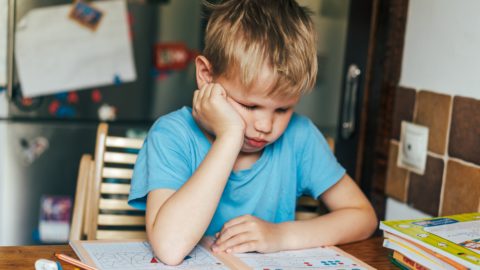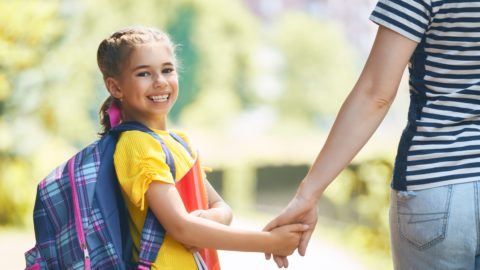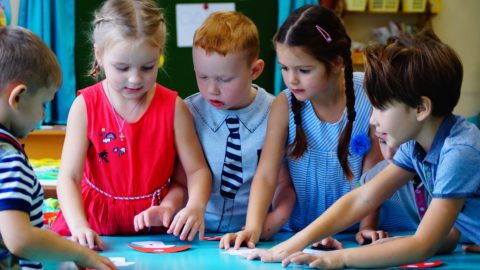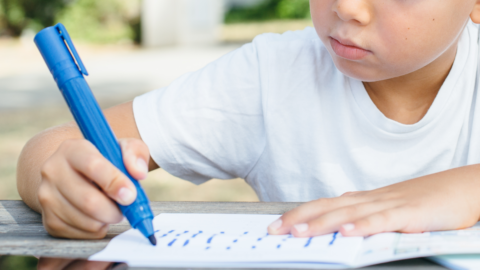Parenting tiny humans is exhausting.
Parenting tiny humans during a pandemic is a whole ‘nother level.
One thing that may be weighing heavily on your mind is the social, emotional, and academic toll this health and economic crisis may be having on your kid(s). As an educator/mom, I’m right there with you. Childcare closures and emergency remote learning this past spring obviously weren’t ideal, and we’re all eagerly awaiting the day our children can safely resume their regular activities and social interactions.
Now that it’s summertime, “the summer slide” of learning loss is anticipated to be steeper than ever due to the compounded effects of the coronavirus. We certainly have our work cut out for us to combat COVID-19’s impact on children, especially for our more vulnerable populations (OECD). But we’ll come together to support our kids, and this, like all things, shall pass.
The struggles of being a parent now are very real, but mindset is everything.
While it may not feel like it at times, you are enough. You are exactly the person your child needs to navigate these uncharted waters. If you were floundering like most parents (myself included) from March to June, you can facilitate meaningful at-home learning this summer and beyond if necessary. You don’t have to push paper packets or do cutesy Instagrammable stuff to engage your child’s mind either.
If you keep an eye out for teachable moments throughout the day, you’ll discover learning is everywhere. There’s a lot to juggle now, so let’s keep summer learning simple if possible. Leave the glitter and glue in the closet (unless you enjoy that kind of thing) and consider these 10 easy-to-implement ways to continue learning during the summer days ahead instead:
- Play: If you’re concerned that your child is playing too much, let’s cross that off of your list of worries. Kids generally don’t get enough unstructured playtime in school anyway. But play helps children develop cognitive, language and literacy, social, emotional, and physical skills (NAEYC). As Fred Roger put it, “Play is often talked about as if it were a relief from serious learning. But for children, play is serious learning. Play is really the work of childhood.” So, offer simple, open-ended materials or toys for them to manipulate. Encourage pretend play, and be ready to channel your inner child to play alongside them (especially in the absence of peers).
- Read Stuff: Load up on books! If your public library hasn’t yet opened its doors, many are now offering pick-up services for holds. You can also arrange to have a book swap with a friend/neighbor who has a similarly-aged child. Or, kids can earn “book bucks” for good behavior to purchase texts on topics of interest. This treats reading like a treasure rather than a chore. And, is there anything more exciting than getting a package in the mail these days? Also, don’t forget, we live in a print-rich world. Prompt your child to read store names, traffic signs, GrubHub menus, etc. This not only helps them build confidence, but it uncovers the real-world value of reading also.
- Write Stuff: Let them decorate a journal for jotting down thoughts or to narrate their life. Have them write their name, high frequency words, or positive affirmations with sidewalk chalk. Have them handwrite/mail an actual letter to a friend. It really doesn’t matter what children are writing, as long as they’re writing.
- Make Stuff: Invite your child to make something with you. Baking sweet treats is always a big hit. Plus, you can reinforce the five senses and skills like measuring and following multi-step directions. Even if you just plop ready-made cookie dough on a tray, they still can practice counting. It’s a good sensory experience, too!
- Watch Good Stuff: It’s alright if technology use in your household is a bit higher than normal. The American Academy of Pediatrics even says so. While it’s still important to set reasonable limits, high-quality programming from trusted resources such as PBS Kids can enhance learning. Here are some good Educational Netflix Shows, too. And with limitations on face-to-face peer socialization, children still learn the unwritten rules of play by watching the interactions of TV characters. This is referred to as “onlooker play.” Be sure to conversate about what they’re watching as well.
- Grow Stuff: Plant some flowers or fruit/veggies in your garden. Discuss plant parts and needs. Or, grow insects! Watch the transformation of caterpillars or ladybug larvae via InsectLore.com (kits are available on Amazon.com, too). I promise it’s easy, and the bugs do all the work!
- Ask for Help With Stuff: Doing the laundry? They can sort the clothes into piles. Need groceries? They can help you create the list. Time to take the trash out? They can help while learning about the 3Rs (reduce, reuse, recycle).
- Discuss Stuff: Use this extended time at home to engage in dialogue with your child about current events. Talk in developmentally appropriate ways about COVID-19 and the Black Lives Matter Protests. And with the increase in kids’ use of digital platforms, it’s a good time to reinforce the five basics of digital citizenship.
- Explore the Outdoors: Get outside! Hit up local trails, parks, or even your own backyard. Outdoor exploration helps children develop a love and respect for nature. It decreases stress and anxiety. It requires physical activity. It taps into children’s natural curiosity about the world. It expands their vocabularies. The list goes on. Being outdoors is generally considered low-risk, so take advantage of this time. Some studies even suggest that vitamin D protects against COVID-19.
- Be Bored: Relieve yourself the pressure of having to entertain your child 24/7. Having enough activities to fill these days is nearly impossible anyway. Make them responsible for their boredom and they will figure something out to do. Boredom promotes problem-solving, inspires imagination, cultivates creativity, and supports children in becoming self-reliant individuals.
And remember, kids are learning more than we as parents sometimes realize. Adversity builds character, and life lessons are abound. Sure, this sort of learning may not perfectly align with your child’s grade level curriculum, but for now, that’s OK.
Resilience. Adaptability. Empathy. Kindness. Gratitude. Cooperation. Our children are learning by observing these sorts of traits in us daily. As parents, let’s focus on the stuff that matters most. Let’s continue showing up for our kids the best way we know how. It is enough.
As for the learning deficits this crisis has caused? They’ll be thoroughly addressed soon enough. My educator buddies and I will make sure of it!









